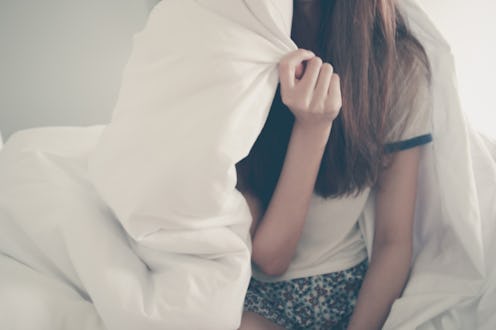Life
7 Signs Your Sleep Issues Might Be From Anxiety

It's extremely frustrating to be unable to sleep at night, and it can be hard to pinpoint exactly what is causing the problem. Issues with sleep can happen as a result of anything from your daily habits or even your diet, but you can also look out for some signs your sleep troubles are caused by anxiety. Once you start with the cause of your sleep issues, you can take the proper steps to remedy them, and it's not always obvious that anxiety is the reason for your insomnia, night sweats, or bad dreams.
"Anxiety is commonly associated with sleep problems," says Dorian Crawford, PsyD over email. "As a result, people who are anxious tend to get less sleep than they need. Unfortunately, this means they are less capable of managing stressors, feel more frayed and are perpetually fatigued. The consequence is a cycle of feeling tired, feeling less capable, worrying about being less capable and a reduced likelihood of quality sleep the next night.
If you aren't sleeping well and think your mental state may to be blame, watch out for these seven signs your sleep troubles are actually caused by anxiety, according to experts. If this pattern goes on for too long, it is always advisable to talk to your physician or see a therapist.
1Your Mind Is Racing When You Get Into Bed
When your mind is anxious, there are often physiological components to that anxiety, and you might notice some restlessness or a jittery feeling. Those types of body-based signals will interrupt the body's natural relaxation process that takes place before sleep. "An excellent way to manage this is to get some exercise," says Crawford. "It does not have to be vigorous exercise, though that may feel satisfying. A walk early in the evening, sex, yoga, stretching or even a swim will help expend pent-up energy and restlessness associated with anxiety."
2Your Thoughts Wake You Up In The Middle Of The Night
It’s normal to wake throughout the night, sometimes multiple times, but worried thoughts can prevent you from falling asleep again. "Practice some quiet mindfulness, meditation, or guided imagery relaxation exercises to distract your mind," says Dr. Lindsay Henderson, PsyD, a Psychologist who treats patients virtually via telehealth app LiveHealth Online over email. "If you can’t fall asleep within 20 minutes or so, get out of bed and do something simple to distract and tired yourself, such as folding laundry or straightening up the house. Avoid screens, as the blue light can disrupt hormones that contribute to healthy sleep."
3You Have Frequent Nightmares
"Dreams can be a window into what is on your mind, and sometimes we don’t realize just how much is weighing on us," says Henderson. "Pay attention to your dreams and focus on some of the content during wakeful hours so that your mind isn’t forced to process it all during sleep. Talking to a therapist about life stressors can also be helpful with this."
4You Hate Being Alone
"Sleep is the ultimate separation and vulnerability, and if you are someone who has trouble being alone, sleep can be a challenge," says Henderson. Practice being alone during daytime hours, and strive to develop a tolerance of having time to yourself without the physical or virtual presence of others.
5You Dread Bedtime
"Feeling stressed about being able to sleep is almost like a form of performance anxiety," says Henderson. "Sleep is actually a skill we are all challenged to develop and maintain throughout our lives, and not being able to perform at it can be quite stressful. Worrying, however, only makes it worse. Again, working with a therapist to practice CBT techniques can help greatly with this fear of sleep."
6You Have Stomach Troubles
Anxiety floods the body with stress hormones, and these hormones can cause the digestive system to go haywire, resulting an anything from diarrhea, to cramping, to nausea. "If you are managing a particularly stressful and anxiety-provoking time, it is vital to focus on eating a healthy diet and consuming adequate water," says Crawford. "You also might want to lay off of caffeinated beverages, as they not only add to the jitters, but also can have a slight laxative effect."
7You Wake Up Really Early
When struggling with anxiety, it is not uncommon to have some depressive symptoms, too. "One of those symptoms is waking early with racing thoughts," says Crawford. "The racing thoughts are going to come on strong and fast if you let them, and that will arouse your body into unpleasant wakefulness." Her solution: Attempt some deep breathing and focused visualization in order to settle your mind and hopefully drift back to sleep. If that doesn't work, get up, do some light stretching or something creative like writing, drawing, or knitting instead of indulging in your thoughts.